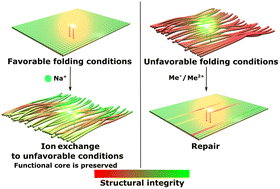Ion-mediated control of structural integrity and reconfigurability of DNA nanostructures†
Abstract
Nucleic acid-based biomolecular self-assembly enables the creation of versatile functional architectures. Electrostatic screening of the negative charges of nucleic acids is essential for their folding and stability; thus, ions play a critical role in nucleic acid self-assembly in both biology and nanotechnology. However, the ion–DNA interplay and the resulting ion-specific structural integrity and responsiveness of DNA constructs are underexploited. Here, we harness a wide range of mono- and divalent ions to control the structural features of DNA origami constructs. Using atomic force microscopy and Förster resonance energy transfer (FRET) spectroscopy down to the single-molecule level, we report on the global and local structural performance and responsiveness of DNA origami constructs following self-assembly, upon post-assembly ion exchange and post-assembly ion-mediated reconfiguration. We determined the conditions for highly efficient DNA origami folding in the presence of several mono- (Li+, Na+, K+, Cs+) and divalent (Ca2+, Sr2+, Ba2+) ions, expanding the range where DNA origami structures can be exploited for custom-specific applications. We then manipulated fully folded constructs by exposing them to unfavorable ionic conditions that led to the emergence of substantial disintegrity but not to unfolding. Moreover, we found that poorly assembled nanostructures at low ion concentrations undergo substantial self-repair upon ion addition in the absence of free staple strands. This reconfigurability occurs in an ion type- and concentration-specific manner. Our findings provide a fundamental understanding of the ion-mediated structural responsiveness of DNA origami at the nanoscale enabling applications under a wide range of ionic conditions.



 Please wait while we load your content...
Please wait while we load your content...